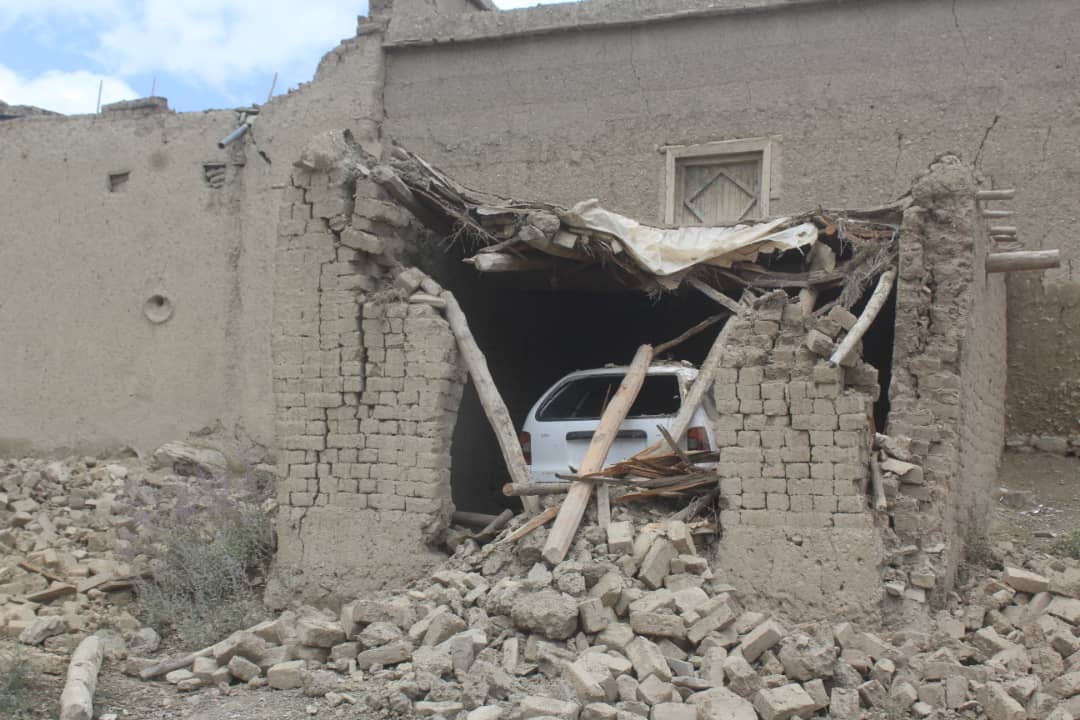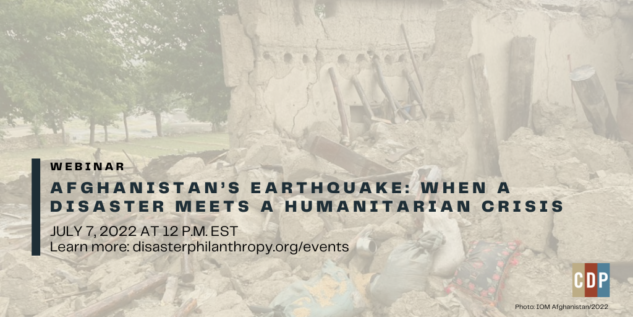What we’re watching: Weekly disaster update, June 27

We know all too well that disaster can strike at any time, in any place in the world. Some disasters make headlines; others do not. Here at the Center for Disaster Philanthropy, we keep an eye on the status of disasters worldwide and compile a list of the ones we’re tracking weekly, along with relevant disaster-related media coverage.
Here’s what we’re watching for the week of June 27, 2022.
New or Emerging Disasters
Earthquake – Afghanistan: On June 22, an earthquake of magnitude 5.9 on the Richter scale hit 29 miles southwest of Khost city. The earthquake struck at a shallow depth of only 6 miles in a region with buildings vulnerable to earthquake shaking. State media has reported at least 1,150 people killed and almost 3,000 homes damaged. The deadliest earthquake in two decades affected Paktika and Khost provinces. The area continues to experience aftershocks, with five people killed and 11 injured by an aftershock on June 24. Aid has begun to reach affected people, but challenges remain, including limited communication channels and poor road conditions. The Taliban requested international assistance and pledged not to interfere with international efforts. The country is already facing a humanitarian crisis with a struggling economy, displacement and acute food insecurity.
For more, see the 2022 Afghanistan Earthquake disaster profile. Donors can support long-term recovery efforts through the CDP Global Recovery Fund by choosing “2022 Afghanistan Earthquake.”
We’re hosting a webinar on July 7 at 12 p.m. ET to explore the impact of the earthquake and how funders can support immediate & ongoing needs. Learn more and register.
Floods – China: In southern China, major flooding on June 21 forced tens of thousands of people to evacuate. The provinces of Guangdong and Jiangxi were among the worst affected, with the homes of at least 500,000 people in Jiangxi damaged. Authorities in Guangdong province’s Shaoguan city asked residents in low-lying neighborhoods to move to higher ground after floodwaters hit a 50-year high. They estimate economic losses to be $70.21 million (470 million yuan), with nearly 107,000 acres (43,300 hectares) of crops destroyed.
Previous/Ongoing Disasters
Floods – Bangladesh and India: After experiencing deadly flooding in May, northeastern India and Bangladesh’s Sylhet region were affected by flooding again the week of June 19. The region is used to occasional floods, but this year, the rains have been particularly intense, a reminder that climate change produces more extreme weather patterns. The Indian state of Assam received double its monthly average rainfall in the first three weeks of June. Water levels in Bangladesh’s northern areas are expected to remain dangerously high. Bangladesh’s government and humanitarian partners continue to distribute relief, including the provision of shelter.
Floods – Montana: The devastating flooding in south-central Montana damaged at least 115 properties in Carbon, Park and Stillwater counties. The state has sought to activate FEMA’s Individual Assistance Program, which is part of the presidential major disaster declaration issued by the Biden Administration on June 16. Governor Greg Gianforte has made funding available to businesses impacted by the flooding. On June 22, the Yellowstone National Park re-opened three of the park’s five entrances for the first time since June 13. However, cleanup and recovery in the park and surrounding communities continue and will be a long journey.
Monkeypox – Global: The Centers for Disease Control and Prevention has confirmed 201 cases in the U.S. As of June 15, the World Health Organization (WHO) said there were 2,103 cases reported from 42 countries since January. Nearly all the cases have been reported since May, and 84% of confirmed cases are from the WHO European Region. Other sources show even higher numbers of global cases. Despite a rapid rise in cases in Europe, WHO has decided not to declare monkeypox a global emergency, describing it as an “evolving health threat” instead.
Humanitarian Crisis – Ukraine: Since June 21, there have been more than 8 million border crossings from Ukraine since Feb. 24, according to the United Nations High Commissioner for Refugees. As of June 22, United Nations (UN) agencies and partners have reached more than 8.85 million people with life-saving assistance. Ukraine is facing humanitarian crises on several fronts, and aid groups are preparing for long-term displacement and recovery.
According to Candid, 992 grants worth $1,228,860,746 have been granted so far, with an additional 176 pledges worth $697,238,080. Funders can share their grants data with them by emailing egrants@candid.org.
For more, see the Ukraine Humanitarian Crisis disaster profile and Ukraine Humanitarian Crisis Recovery Fund.
Worldwide – Coronavirus:
Key facts as of June 27:
- Worldwide, cases have surpassed 549 million.
- There have been more than 524 million recoveries and more than 6.3 million deaths.
- The highest number of cases are in the U.S. (88.7 million), followed by India (43.4 million), Brazil (32 million) and France (30.5 million).
- Worldwide, 66.4% of the global population has received at least one dose of a COVID-19 vaccine. This number drops to only 17.8% in low-income countries.
Other notable news:
- A new booster shot from Moderna has been shown in clinical trial data to be highly effective against Omicron subvariants. Regulatory approval is still needed, but the company aims to have the new vaccine ready for public distribution by August.
For more, see the COVID-19 Coronavirus disaster profile.
U.S. Midwest Low-Attention Disasters
The Midwest is regularly faced with low-attention disasters that affect people across the region. CDP’s Midwest Early Recovery Fund (ERF) effectively funds efforts that catalyze equitable disaster recovery.
These are some of the latest disasters the ERF team is monitoring:
- Randall, Minnesota, received up to 12 inches of rainfall in under six hours on June 23. Severe thunderstorms led to water from the Little Elk River rising above its banks, causing significant flooding in the central Minnesota city.
- People have been battling floodwaters in Rainy Lake, Minnesota, for nearly a month. The large lake near the Canadian border is starting to drop very slowly. However, in addition to property damages, the disaster has taken an emotional toll on residents.
- The community of Denton, Montana, continues to rebuild following a devastating fire in November. Amidst the rebuilding, the community is also preparing for more wildfires.
Complex Humanitarian Emergencies – Colombia
Many places worldwide are experiencing emergencies caused by conflict, climate change, drought, famine, economic challenges and other conditions that combine to create a complex humanitarian emergency (CHE). CDP maintains complete profiles on several CHEs.
On June 19, Gustavo Petro, a leftist candidate, won Colombia’s presidential election by galvanizing voters frustrated by decades of poverty and inequality. His administration faces a polarized society and no shortage of humanitarian challenges.
These challenges are currently driven by a combination of factors, including renewed conflict, the COVID-19 pandemic, rising internal displacement and large numbers of Venezuelan migrants. Last year was the most violent armed conflict in the country since the 2016 peace deal. The International Committee of the Red Cross (ICRC) identified six ongoing armed conflicts that have helped fuel displacement.
The Internal Displacement Monitoring Centre counted 134,000 internal displacements in 2021, of which 41% involved African Colombians and Indigenous people. Disasters displaced an additional 32,000 people.
The city of Riohacha has become a primary destination for forcibly displaced Venezuelans abroad, with more than 47,000 refugees and migrants hosted there. A report from Refugees International makes a case for greater Venezuelan economic inclusion to help mitigate challenges while supporting the local economy.
Antipersonnel mines (APM) and explosive remnants of war (ERW) continue significantly affecting victims and survivors. It is estimated that 18 out of every 100 APM and ERW victims in the country are children or adolescents. School closures related to COVID-19 have negatively impacted children in Colombia, especially Venezuelan children living in informal settlements, borderlands or rural areas.
What We’re Reading
- The Demographics of Disaster – U.S. News: “A U.S. News Healthiest Communities analysis shows how racial and ethnic minority groups are at highest risk from various natural hazards. In many ways, experts say, there’s nothing natural about why that’s the case.”
- Burning planet: why are the world’s heatwaves getting more intense? – The Guardian: Scientists say heat waves are increasing in frequency and intensity because of human-induced climate change, posing a severe threat to human health.
- LGBTI funding steadily growing, but eclipsed by sums spent on anti-LGBTI movement – Alliance: Funding for groups working on LGBTI issues grew by 3% from 2019 to 2020, according to a report from the Global Philanthropy Project. However, it’s a small percentage of overall global funding and overshadowed by funding to the anti-LGBTI movement.
- Freeing Ourselves from Colonial, White Savior Models of Philanthropy – Nonprofit Quarterly: Nicolette Naylor and Nina Blackwell call on philanthropy to “interrogate how our histories continue to shape the present.” They offer questions that can be asked and answered to confront the underlying white supremacy we espouse and then share opportunities for meaningful action.
Last week included some very high daily temperatures where I live in Denver, Colorado. This nifty interactive tool shows where daily temperatures in cities across the U.S. rank.

